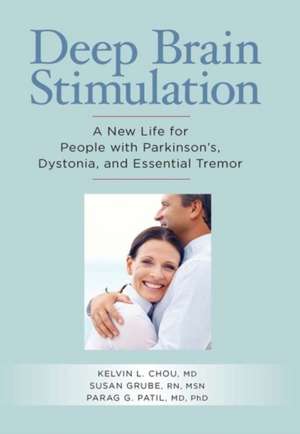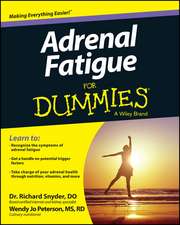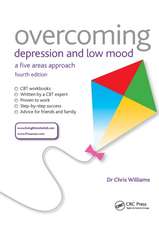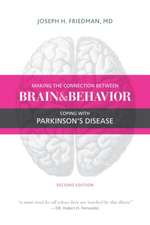Deep Brain Stimulation: A New Life for People with Parkinson's, Dystonia, and Essential Tremor
Autor MD Chou, Kelvin L., Susan Grube, Parag Patilen Limba Engleză Paperback – 30 noi 2011
Preț: 114.67 lei
Nou
Puncte Express: 172
Preț estimativ în valută:
21.94€ • 22.97$ • 18.16£
21.94€ • 22.97$ • 18.16£
Carte disponibilă
Livrare economică 17-31 martie
Preluare comenzi: 021 569.72.76
Specificații
ISBN-13: 9781936303113
ISBN-10: 1936303116
Pagini: 166
Dimensiuni: 150 x 229 x 8 mm
Greutate: 0.23 kg
Ediția:New.
Editura: Demos Medical Publishing
ISBN-10: 1936303116
Pagini: 166
Dimensiuni: 150 x 229 x 8 mm
Greutate: 0.23 kg
Ediția:New.
Editura: Demos Medical Publishing
Notă biografică
Kelvin L. Chou, M.D., is a board-certified, fellowship-trained neurologist with expertise in Parkinson's disease and other movement disorders. He has been at University of Michigan since 2007, where he is an Associate Professor of Neurology and Neurosurgery and Co-Director of the STIM (Surgical Therapies Improving Movement) program. He has also been named to the “Best Doctors in America” list.
Susan Grube, R.N., M.S.N., is an advanced practice registered nurse who has been with the University of Michigan Department of Neurosurgery for 19 years. She has undergone specialized training in the care of patients with deep brain stimulation (DBS), and is the coordinator of the STIM (Surgical Therapies Improving Movement) program. She is a resource to those interested in learning about DBS, and to those who have been implanted with a DBS system.
Parag G. Patil, M.D., Ph.D., is a neurosurgeon specializing in deep brain stimulation for Parkinson's disease, movement disorders and other conditions. He is an Assistant Professor of Neurosurgery and Co-Director of the STIM (Surgical Therapies Improving Movement) Program at UM. His research has been featured in Time magazine and on the cover of Neurosurgery.
Susan Grube, R.N., M.S.N., is an advanced practice registered nurse who has been with the University of Michigan Department of Neurosurgery for 19 years. She has undergone specialized training in the care of patients with deep brain stimulation (DBS), and is the coordinator of the STIM (Surgical Therapies Improving Movement) program. She is a resource to those interested in learning about DBS, and to those who have been implanted with a DBS system.
Parag G. Patil, M.D., Ph.D., is a neurosurgeon specializing in deep brain stimulation for Parkinson's disease, movement disorders and other conditions. He is an Assistant Professor of Neurosurgery and Co-Director of the STIM (Surgical Therapies Improving Movement) Program at UM. His research has been featured in Time magazine and on the cover of Neurosurgery.
Cuprins
1. A Little History on Deep Brain Stimulation; 2. How does DBS work and what can it do for me; 3. Being Evaluated for Surgery: Do I Qualify; 4. Choosing the Health Care Team that is Right For You; 5. Health Risks and Possible Complications in Surgery; 6. Telling Family and Friends; 7. How to Prepare for the Big Day; 8. What Should I Expect During the Surgery; 9. I've Done it...Now What; 10. Taking Care of Your DBS System; 11. My Symptoms Are Not Under Control - Troubleshooting Your System; 12. Annual Maintenance; 13, Long Term Side Effects; 14. Frequently asked Questions; Appendices: A. Definitions/Glossary; B. Patient Support Organizations; C. List of Commonly Prescribed Medications.
Descriere
In the United States, an estimated 42 million people suffer from some form of movement disorder, including Parkinson’s disease (PD), essential tremor (ET), and dystonia. Although medications may be helpful for these conditions, in many patients, symptoms cannot be controlled with medications alone. In such situations, their physicians may recommend a surgical procedure known as Deep Brain Stimulation (DBS). DBS is a revolutionary technology using an implanted device to deliver electrical stimulation to the brain to help symptoms, alleviate suffering, and improve quality of life.
Deep brain stimulation has dramatically changed the lives of many patients with uncontrollable tremors. Patients often can resume normal activities, such as feeding and dressing themselves, and can have active and fulfilling lives. The need for anti-tremor medications is often reduced or eliminated.
Though it's no longer considered experimental, DBS is, for now, still used as a second- or third-line treatment, reserved for patients with more advanced cases of the disease and those for whom medication alone is inadequate or can't be adjusted precisely enough to keep their tremors and writhing under control.
The use of Deep Brain Stimulation continues to evolve and doctors are realizing that the earlier they perform the procedure the more they can improve the quality of life of their patients. Deep Brain Stimulation is the first book to be written by a team of experts that clearly explains the benefits, pros, and cons of this revolutionary new treatment.
Deep brain stimulation has dramatically changed the lives of many patients with uncontrollable tremors. Patients often can resume normal activities, such as feeding and dressing themselves, and can have active and fulfilling lives. The need for anti-tremor medications is often reduced or eliminated.
Though it's no longer considered experimental, DBS is, for now, still used as a second- or third-line treatment, reserved for patients with more advanced cases of the disease and those for whom medication alone is inadequate or can't be adjusted precisely enough to keep their tremors and writhing under control.
The use of Deep Brain Stimulation continues to evolve and doctors are realizing that the earlier they perform the procedure the more they can improve the quality of life of their patients. Deep Brain Stimulation is the first book to be written by a team of experts that clearly explains the benefits, pros, and cons of this revolutionary new treatment.










